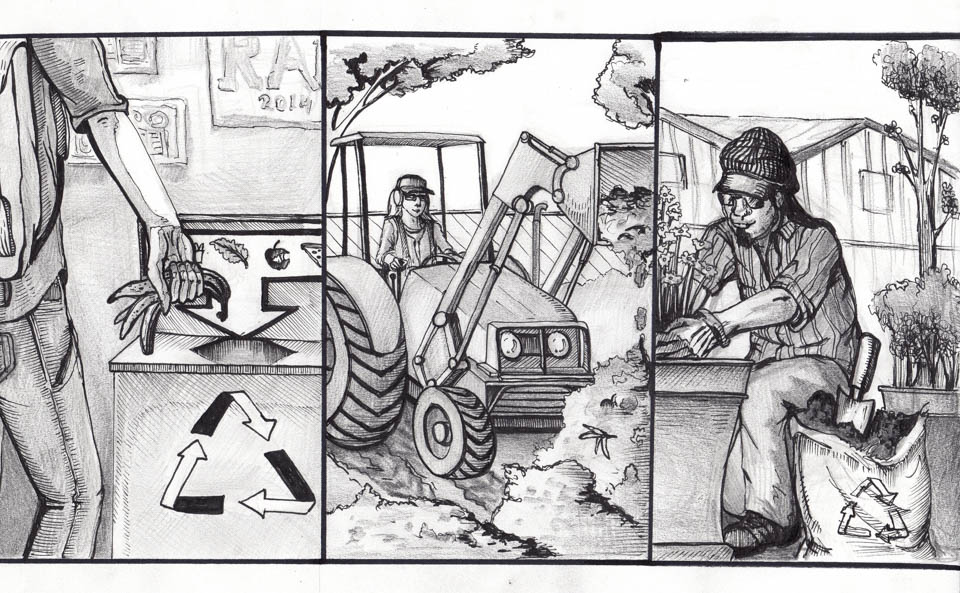City College will not meet zero-waste ordinance if students continue to improperly dispose waste
Recycling department makes extra effort to reorganize compost, trash and recycling bins

By Patrick Fitzgerald
The Guardsman
It is much tougher to meet San Francisco’s zero-waste ordinance goal by 2020 on City College campuses when people do not know how to or take the time to do it well.
“It was different when we were just trying to tell people to recycle. Now we are telling you to recycle and compost,” Carlita Martinez, City College’s recycling coordinator said. “Big difference, big work, big challenges, it is big.”
In 2013, City College recycled and avoided landfill for 1,367 tons of many materials: paper, plastic, electronic waste, ink cartridges, bottles and cans, cardboard, light bulbs, furniture, metals and wood. City College composted, 250 tons of food waste and 200 tons of green waste.
Eighteen percent of methane gas in the United States comes from landfills. Methane gas is 20 times more potent than carbon dioxide as a greenhouse gas at trapping heat on our planet, according to the U.S. Environmental Protection Agency.
Making a difference
Students, faculty, staff and administrators can make a real difference in climate change by helping to reduce the waste that goes into landfill just by picking the right bin for your waste.
“It is kind of confusing because sometimes you stand in front of the bin and you’re like is this compost or is this recyclable or is this just normal waste,” City College student Kossewa Tossoukp said. “Then you get confused and you don’t know where to put it in and you just throw it somewhere because you don’t have the time to think.”
Compost, what goes into the green bin, must be kept clean from other contaminants. Only food is to be composted together with food-soiled paper and anything else that was once alive. Food thrown away in a plastic or foil-like bag is a contaminant.
“The compost is a very fragile component of it,” Keith Brown said, a City College recycling supervisor, trainer and specialist. “If you contaminate with aluminum and plastics, all that energy, time and effort into collecting compost ends up going into the landfill.”
The blue bin is for any plastic, paper, metal and glass. Food containers should be rinsed before disposal. When in doubt, throw it out in the black bin including candy wrappers, waxed paper drink containers, potato chip and other plastic and foil bags.
Slow but steady progress
“I’d say we are over 50 percent (to zero-waste),” Martinez said. “I love compost. Compost grows apples you know.“
In 2009, San Francisco passed the most comprehensive mandatory composting and recycling law in the nation with a goal of becoming a zero waste city by 2020.
In 2010, San Francisco exceeded its goal of moving 75 percent of trash away from landfills according to the San Francisco Department of the Environment.
San Francisco recycling and compost ordinance is the first of its kind in the United States, according to the San Francisco Chronicle. Being the first city to pass such a zero-waste policy poses a host of unique challenges for City College because it must comply with the ordinance.
The biggest challenge to City College recycling program is understaffing, according to Martinez. Not having enough staff limits the department’s ability to what can be done which affords little opportunity for outreach and education.
“I think we need to teach each other about recycling and learn more about putting things in the right places,” said Timothy Harper, a recycling collector. “By doing the right thing and doing outreach to each other and showing people the proper place, it would be much better for everybody on campus.”
Until City College finds the funds for greater outreach, exact details for proper recycling can be found at San Francisco’s Department of the Environment’s website at www.sfenvironment.org and CalRecycle at www.calrecycle.ca.gov. You can search the website by asking “what goes where” and “what can be recycled.”

Comments are closed.